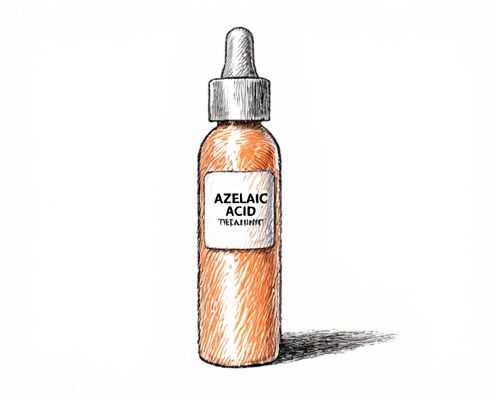
Azelaic acid treatment Illustration
Azelaic acid treatment effectively targets acne, rosacea, and hyperpigmentation by reducing inflammation and bacterial growth while promoting cell turnover to even skin tone. Its gentle exfoliating properties make it suitable for sensitive skin, minimizing irritation compared to stronger acids. Consistent use of azelaic acid supports clearer, smoother skin with a noticeable reduction in redness and discoloration.
What Is Azelaic Acid?
Azelaic acid is a naturally occurring dicarboxylic acid found in grains such as barley, wheat, and rye, widely used in skincare for its anti-inflammatory and antibacterial properties. It effectively treats acne, rosacea, and hyperpigmentation by inhibiting the growth of acne-causing bacteria and reducing keratin production that clogs pores. Dermatologists often recommend azelaic acid for sensitive skin due to its gentle yet potent action in evening skin tone and preventing breakouts.
Top Benefits of Azelaic Acid for Women's Skin
Azelaic acid effectively reduces inflammation and hyperpigmentation, making it ideal for treating acne and rosacea in women's skin. Its antioxidant properties protect against free radical damage while promoting even skin tone and reducing dark spots. Regular use improves skin texture, combats clogged pores, and supports overall skin clarity and radiance.
How Azelaic Acid Targets Hyperpigmentation
Azelaic acid effectively targets hyperpigmentation by inhibiting tyrosinase, the enzyme responsible for melanin production, which helps to reduce dark spots and uneven skin tone. This treatment also promotes gentle exfoliation, accelerating skin cell turnover and revealing a brighter complexion. When used consistently, your skin appears clearer and more radiant as azelaic acid prevents the formation of new pigmentation.
Azelaic Acid Versus Other Skincare Acids
Azelaic acid offers unique benefits compared to other skincare acids like salicylic and glycolic acids, targeting inflammation, acne, and hyperpigmentation simultaneously. Its antimicrobial and anti-inflammatory properties make it effective for rosacea and mild to moderate acne without causing excessive dryness or irritation. Unlike stronger exfoliants, azelaic acid provides gentle skin renewal suitable for sensitive skin types, promoting a clearer, more even complexion.
Azelaic Acid for Acne-Prone Female Skin
Azelaic acid is a potent treatment for acne-prone female skin, effectively reducing inflammation and bacterial growth while exfoliating dead skin cells. Its anti-inflammatory and antimicrobial properties help to unclog pores and diminish the appearance of post-acne hyperpigmentation, promoting a clearer complexion. Regular use of azelaic acid can balance sebum production and improve skin texture, making it a valuable addition to acne management routines for women.
Step-by-Step Guide: How to Apply Azelaic Acid
Start with a clean, dry face by gently washing your skin using a mild cleanser to remove impurities and excess oils. Apply a pea-sized amount of azelaic acid cream or gel evenly onto your affected areas, avoiding direct contact with eyes and lips. Follow with a moisturizer to prevent dryness and always use sunscreen during the day to protect your skin from UV damage while using azelaic acid.
Combining Azelaic Acid with Other Skincare Products
Combining azelaic acid with niacinamide enhances anti-inflammatory effects and reduces hyperpigmentation for clearer skin. Using azelaic acid alongside gentle moisturizers supports barrier repair and minimizes irritation during treatment. Avoid layering azelaic acid with exfoliating acids like AHAs or BHAs to prevent excessive sensitivity and maintain optimal skin tolerance.
Potential Side Effects and Precautions for Women
Azelaic acid treatment may cause mild side effects in women such as skin irritation, redness, dryness, and itching, particularly during the initial weeks of use. Pregnant or breastfeeding women should consult a dermatologist before starting azelaic acid due to limited safety data in these groups. It is essential to use sunscreen daily while undergoing treatment to prevent increased photosensitivity and avoid exacerbating side effects.
Azelaic Acid During Pregnancy: Is It Safe?
Azelaic acid is considered safe for use during pregnancy due to its minimal systemic absorption and anti-inflammatory properties that help reduce acne and rosacea without harmful effects on the fetus. Studies have shown that topical azelaic acid does not pose significant risks, making it a preferred option for managing pregnancy-related skin concerns. Always consult your healthcare provider to ensure your skincare regimen supports both maternal and fetal health.
Expert Tips for Choosing Azelaic Acid Products for Women
When selecting azelaic acid products for your skincare routine, prioritize formulations with 10-15% concentration for effective treatment of acne and rosacea. Look for additional soothing ingredients such as niacinamide or green tea extract to reduce irritation commonly experienced with azelaic acid. Opt for fragrance-free, dermatologist-tested products to ensure suitability for sensitive women's skin and enhance overall skin tolerance.
 womendy.com
womendy.com